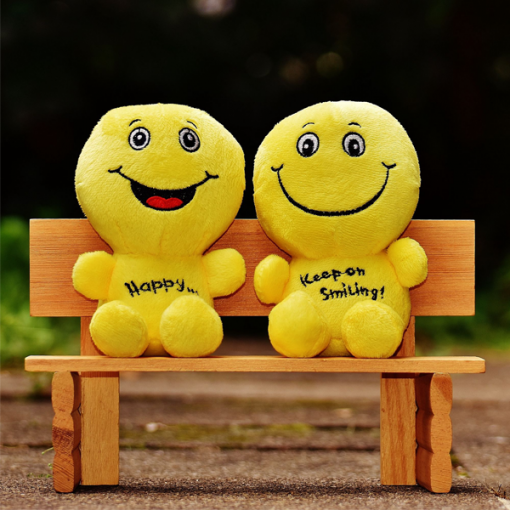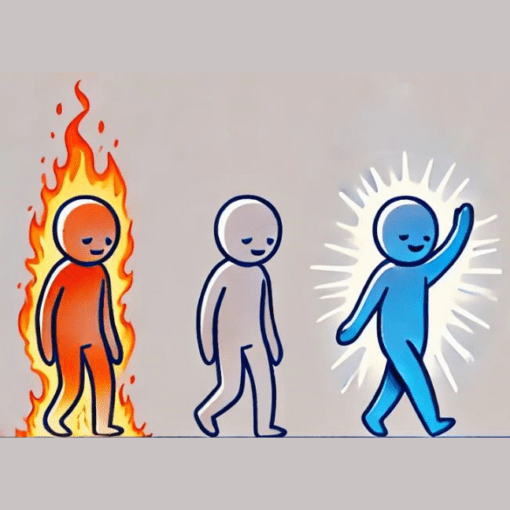I know, I know … it’s been a while since the last newsletter! Did you miss me? 😉😊🙃
There is a good reason for this break, which I am guessing most of you reading this already know … But just in case, a small recap as an introduction to this blog post: last November I left for Germany to support my parents as my step-dad was going through a terminal illness. I spent three months with them, going through some pretty hard stuff while also attempting to continue working (imagine being on Zoom in an 18th century old farm building with iffy Wi-Fi and cows bellowing in the background!).
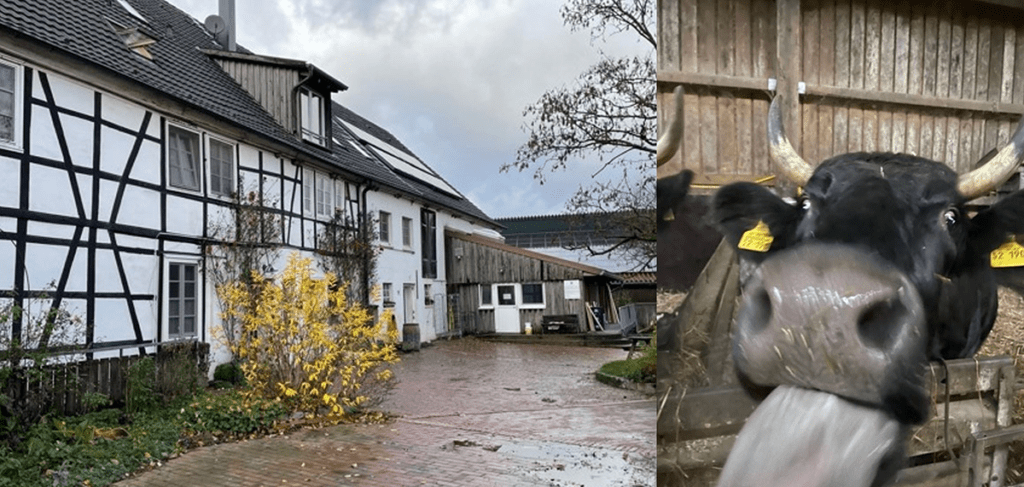
My stepdad, Dirk, died at the end of January. I miss him every day, beyond what can be expressed. But today’s newsletter is not about grief: allow me to give a bit of background before getting to the subject at hand.
During my time in Germany, I continued coaching clients, attending my usual group meetings with non-profits and networking groups, and also continuing to do some of my own outreach work. As you can imagine, this workload was all very difficult—I was often needed in “the other room”, and my emotional bandwidth was pretty thin—yet it also became a lifeline that fed, supported and encouraged me to keep going during a difficult, life-altering, experience. And that experience is what I want to discuss with you today:
THE MANY ROLES THAT WE PLAY IN LIFE

I heard about and studied the concept of Role Theory both in my Adlerian psychology studies and in Psychodrama training. Yet it’s one thing to learn about a topic theoretically and another to experience it vividly in real life – as I am sure most of you know.
A BIT OF THEORY
Role theory is a concept in sociology and in social psychology that considers most of our everyday activities to be the acting-out of socially defined categories (e.g., mother, manager, teacher). Each Role is a set of rights, duties, expectations, norms, and behaviors that a person has to face and fulfill. It became prominent in sociological discourse through the theoretical works of George Herbert Mead, Jacob L. Moreno, Talcott Parsons, Ralph Linton, and Georg Simmel.
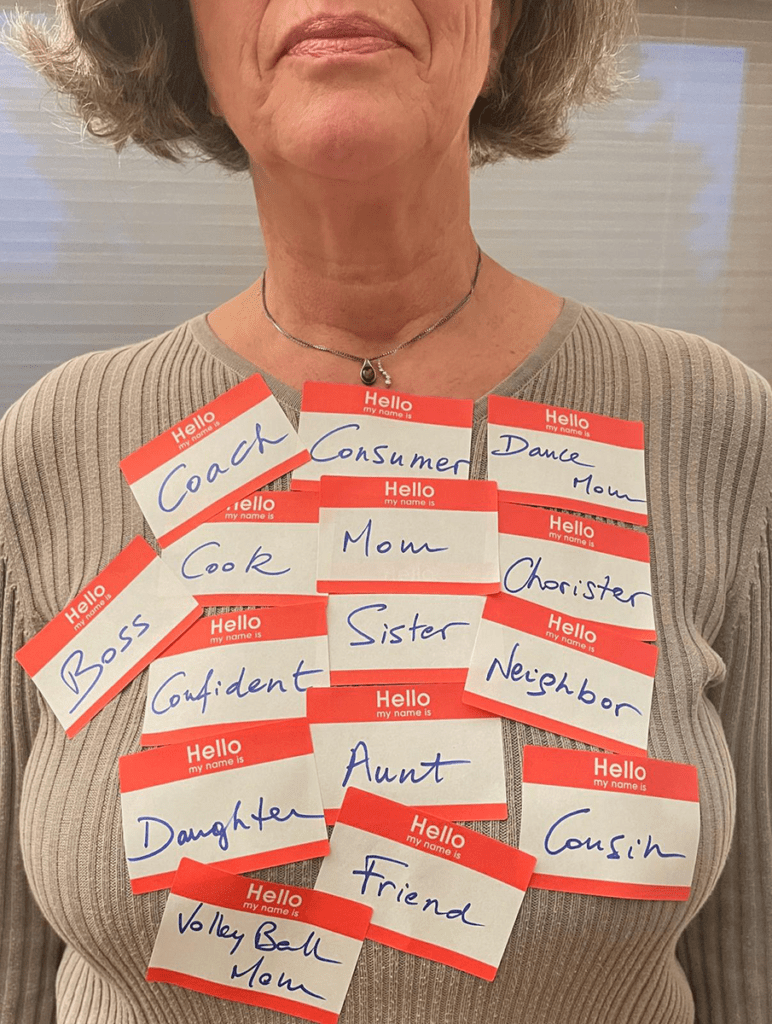
The term Roles refers to the social positions that people have (e.g., mother, teacher, and customer) and the behaviors associated with those positions.

Alfred Adler discussed the fact that “humans are social beings and therefore all behavior is socially embedded and has social meaning” (Watts, 2000b). He stressed the need to understand individuals within their social context, and thus the Roles that we play in our lives are by definition social Roles, i.e. Roles in relationship to others.
Adler also said that everyone must face the three tasks of life daily:

- The task of INTIMACY: in this task, our Role is one of partner to one other human.
- The SOCIAL task: which is the one where we work on all our social relationships (except our intimate one). In this task, our Role is one of either a family member (child of someone, sibling, parent to children etc.), or a friend, or colleague, or member of a group etc.
- The WORK task, which encompasses everything that can be regarded as work: from the actual paid job which gives us our livelihood, to taking care of our homes, to volunteering, to parenting. The Roles we might play in this task are employee/worker, parent, volunteer, caregiver to someone, homemaker, etc.
Jacob Moreno and his wife Zerka Moreno (founders of Psychodrama), talked about a “Répertoire of Roles” that we all have. In this répertoire, our Roles fall in three categories: well developed (the ones we are well practiced in), overdeveloped (the Roles we are too strong in, maybe overdoing), or underdeveloped Roles (the ones we should probably be stronger in).
Roles are also dynamic in the sense that they change over time: we have ascending Roles (new Roles in development, for example, when we become a parent for the first time) and descending Roles (when our children become adults and leave the coop, or when we retire from our career), or “yoyo” roles for examples when our kids leave the coop and come back to live with us 😉!
WHY DOES THIS MATTER?
The wider our Role répertoire and the more conscious we are of our various Roles and their ascending or descending stages, the more mentally healthy we can be. Having this Role répertoire consciousness gives us the ability to make choices about how we respond to life in our various Roles, and to have a greater sense of control over our lives. It allows us to prepare better for upcoming new Roles (new job, new parent…) or to realize when some Roles are overdeveloped or underdeveloped and when to recalibrate. Becoming more conscious of our Role répertoire helps us lead a more satisfying life overall.
Specifically, learning to increase your awareness around the Roles you play can help you clarify the following:
- What different Roles do you play in your life?
- What is your satisfaction level of each of your Roles? Are you satisfied with your Role in your marriage? What about as an employee? Or as a friend?
- Would you like to work on developing some of your underdeveloped Roles, or tone down some of your overdeveloped Roles? For example you might want to tone down your “Good Samaritan” Role in which you always say yes to every request, but increase your Role as “Patient Caregiver” to your aging father.
- Increasing Role awareness can also help with the grieving that might come with a descending Role. For example as a parent when you become an empty nester. Or it can help with the potential stress of a new ascending Role, such as if you are promoted to a new Role at work that requires you to stretch beyond your current capacity.
You can fill out this Roles Table if you’d like to take accurate stock of your current Role répertoire and would like to work on it:

BACK TO MY STORY...
During my three recent months in Germany, it was like suddenly being out of time and space. I walked out of my American life and all of my Roles as a life partner to my companion, a mother to my daughters, an entrepreneur/CEO of my business, and a friend to many. Those Roles still existed for me, theoretically, but I wasn’t able emotionally or physically to inhabit them as I usually do. Instead, all of my strength, energy and focus had to be urgently diverted into playing other Roles that were needed of me in Germany, where I was a daughter, a step-daughter, and a family member to my extended European family (in addition to a caregiver to my step-dad and supporter to my mom). In some of those cases, playing those family Roles meant that there was an unconscious expectation to revert to some of my old Roles and behaviors from when I was much younger. At times it felt like I was being seen in a “freeze frame” Role from 30 years ago even though I had been living different Roles in America for the past three decades. This “freeze frame” challenge was difficult to navigate.
Does any of this sound familiar to you from experiences in your own life? I have a male friend whose wife always reverted back to her Role as a childish little girl whenever they visited her parents in the home she grew up in. I know of a man who complains that he’s forced into playing the Role of a submissive younger brother, even at 60 years of age, when his older brother sees him at Thanksgiving and starts to not-so-playfully poke fun at him, just like he did when they were growing up as kids. Examples like these are not uncommon. We all play Roles. In our families. At work. Among our friends…
And when “freeze frame” challenges hit us, it calls for us to undertake a significant “Role adjustment”. This can be achieved through mindfulness practice in the moment: becoming aware that a Role expectation that is being thrown at us doesn’t fit anymore, noticing an emotional reaction to the mismatch between the Role expectation and the new Role reality, and kindly trying to show—or explain—the new Role reality to the person who is mistakenly freeze framing us in a Role of the past.
One “Role adjustment” that I made in Germany was in reawakening my role as a Caregiver. It is a role that I knew all too well from years of caring for my daughter and husband through their respective illnesses, and now I needed to help provide care to my dying stepfather. But that Role was dormant for me and had to be reawakened. In being aware of what I had to do and then taking clear action to do it, it allowed me to remember how good I was at it, and this let me bring a lot of useful expertise to the situation. Of course, the drawback was that it also reawakened some significant trauma from my past experiences, but the positives far outweighed the negatives. The Role adjustment that I made helped me better handle my stepfather’s end-of-life passage, and also gave him and my mother the loving care that I wanted to share with them.
In addition, what made this extremely difficult time in Europe more bearable was the Coach Role that I continued to play with my clients. This well-developed Role always gives me a sense of belonging and of contribution, as well as a sense of significance. My Role as a Coach makes me feel capable, competent and useful. It is a crucial part of my current identity. In Germany, when everything seemed to be out of control and filled with pain and suffering in the face of my stepfather’s terminal illness, being able to occasionally inhabit my Role as a Coach kept me grounded. Otherwise the Caregiver in me would have had a much harder time of helping out in such a time of need.
I hope you find this reflection about Roles interesting and useful and would love to hear your thoughts about it. Get in touch with me if you would like to do some work around your own Roles!
Thank you for reading.
Wishing everyone a very happy Spring!

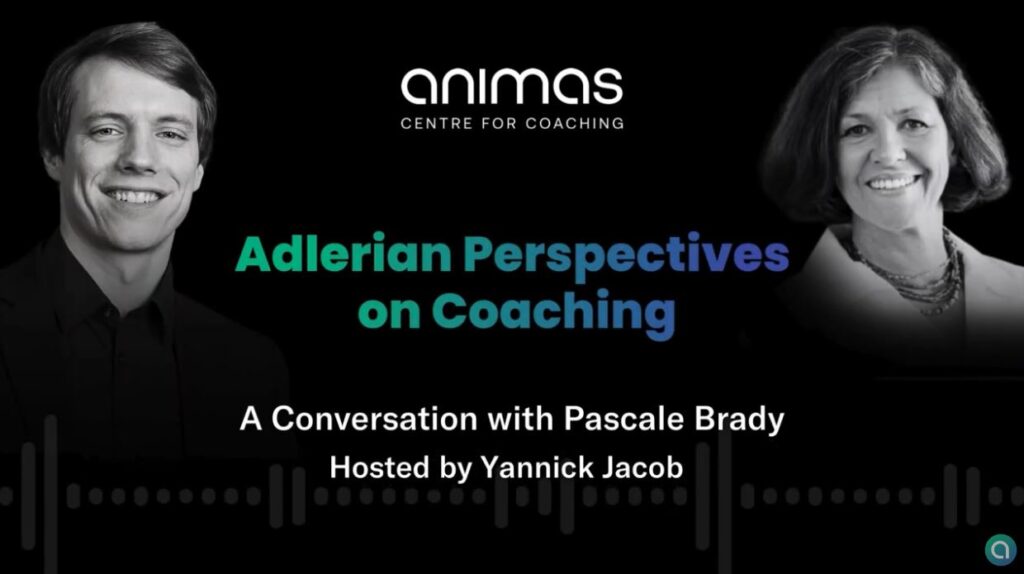
I was deeply honored and humbled to be invited to discuss my favorite topic: Alfred Adler as the grand-father of coaching, with Yannick Jacob for Animas Centre for Coaching.
We covered the five assumptions of Adlerian Psychology:
- Holism - we are indivisible humans made of one piece
- Teleology - everything we do is goal-directed and what matters is our movement, not our words
- Self-determinism - we are always at choice
- Lifestyle and private logic - we live according to conclusions we draw early on in life and which make us see things subjectively; which we can change if we so choose
- Social embeddedness - we can only be considered in the whole context of our whole lives
We also discussed at length an essential pillar of Individual Psychology (also an essential pillar of coaching!): ENCOURGEMENT, as well as Adler’s influence on coaching and modern psychotherapy and the connections between Individual Psychology and many current coaching and therapy movements.
I hope you are able to have a listen to our interesting conversation!
SUBSCRIBE TO THE CHALLENGE COACH NEWSLETTER
Are you ready to receive exclusive insights, tips, and strategies to help you overcome your challenges and achieve your goals? Then sign up for The Challenge Coach's Newsletter today!
As a subscriber, you'll get access to:
- Actionable tips and advice from The Challenge Coach
- Inspiring stories
- Discounts for coaching programs and products
... and much more!
Don't miss out on this incredible opportunity to stay connected with The Challenge Coach and take your personal growth to the next level. Sign up now and join our community of driven, determined, and empowered individuals.

